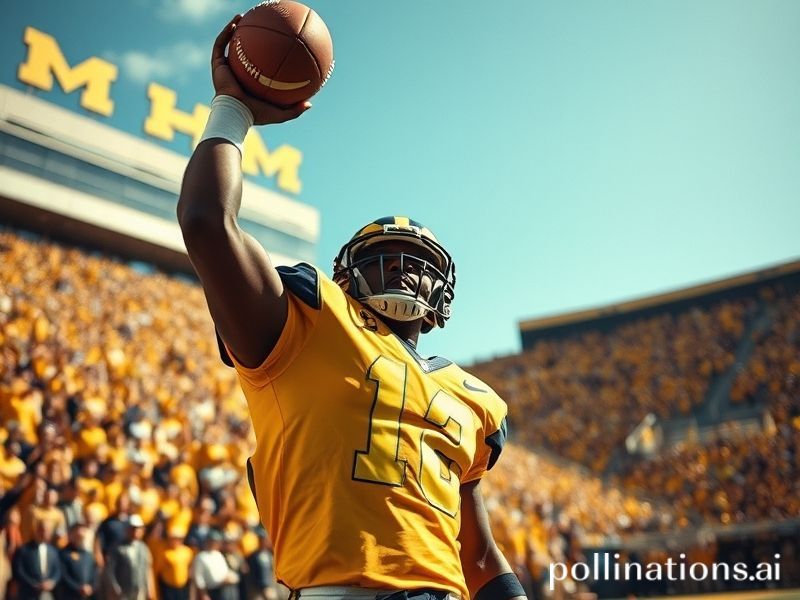Desmond Howard: The Heisman Hero America Forgot to Export
Desmond Howard and the Mirage of Global Stardom
By Our Man in the Upper Deck, somewhere over the Atlantic
The name Desmond Howard still echoes in the collective memory of American sports like a half-remembered jingle from a 1996 sneaker commercial. To the rest of the planet, however, the phrase “Heisman Trophy winner” lands with the dull thud of an inside joke no one bothered to translate. And therein lies the first cosmic punch line: the man once hailed as the most electrifying college athlete in the United States is, beyond U.S. borders, a trivia answer hiding behind a paywall of cultural context.
Europeans, bless their metric hearts, will politely ask whether Howard played the version of football that occasionally bankrupts entire municipalities. Across Asia, where gambling syndicates treat American football like interpretive dance, his 93-yard punt return in the ’97 Super Bowl is filed under “miscellaneous miracles, North American.” Down in São Paulo, the only Howard anyone recalls is the Brazilian pop singer whose career ended in a tax-evasion scandal. Desmond’s global market share is roughly equivalent to the export volume of artisanal Vermont maple syrup: a niche delicacy, heroically irrelevant.
Yet the tale of Howard’s fame is instructive—like a cautionary bedtime story whispered to wide-eyed prospects in the locker rooms of Borussia Dortmund or the Aspire Academy in Qatar. It reminds them that athletic immortality is mostly a regional currency, instantly devalued once you clear customs. Every continent has its own Desmond: the Algerian sprinter who outran a dictator’s son, the Korean pitcher who vanished into the K-pop machine, the Kenyan marathoner whose name becomes a punch line on German late-night TV. Glory, it turns out, has the shelf life of sushi on a Lagos sidewalk.
Still, the NFL’s marketing battalions keep trying to globalize the gospel. They haul teams to Tottenham Hotspur Stadium and cram Tom Brady into Mandarin-language TikToks, hoping to spin provincial legends into planetary myth. Desmond Howard, now an amiable studio analyst, is periodically wheeled out for these missionary exhibitions—smiling, suited, and faintly bemused, like a retired magician asked to explain card tricks to an audience that barely understands the concept of kings and queens. The irony is rich: the league that never figured out how to pay its college players has become a traveling salesman peddling memories of unpaid glory to people who use cricket metaphors to describe traffic jams.
Meanwhile, the geopolitical implications ripple outward. In an age when soft power is measured by streaming rights and merch drops, the failure to export Desmond Howard is a minor but telling data point. China can sell you a refrigerator with a QR code that recites Xi Jinping’s thoughts; America can’t even sell you a highlight reel without a 30-second advert for draft kings dot com. Somewhere in the bowels of the State Department, a mid-level functionary is drafting a white paper titled “Leveraging Former Return Specialists for Indo-Pacific Influence,” then deleting it when the coffee machine breaks again.
And what of the man himself? Howard appears to have made peace with his paradox: a household name in households that already own season tickets. He hosts youth camps in Detroit, mans the desk at ESPN, and collects awards from civic groups who can’t spell “punt return” but appreciate a charitable smile. If he feels the slight sting of global anonymity, he hides it behind the professional cheer of someone who’s learned that relevance, like a 401(k), is mostly about timing and compound interest.
In the end, Desmond Howard stands as a monument to the limits of empire—athletic, cultural, or otherwise. The planet will happily binge Korean dramas, Nigerian Afrobeats, and Scandinavian noir, yet it remains stubbornly indifferent to a man once described as “human electricity” by a commentator who now sells reverse mortgages. The takeaway for our fractured, streaming, end-times world? Fame is a lottery ticket printed in one language, and the house always wins. Place your bets accordingly.







